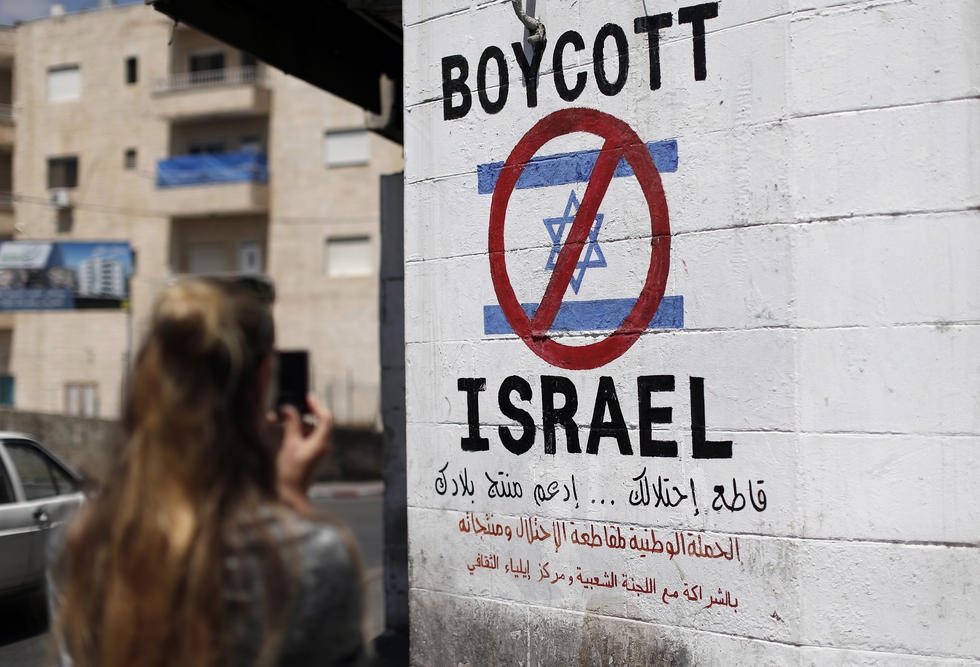BDS: Israel’s self-fulfilling prophecy

Israel appeared to have stepped up its fight against activists of the Boycott, Divestments and Sanctions (BDS) movement this week as Justice Minister Ayelet Shaked announced the state will sue pro-boycott activists at home and abroad. The minister also said that she has doubled the international law team at the ministry expressly for this purpose, and that she will be launching the first lawsuits in the nearest future.
At first glance, the project seems absurd. True, even in the UK the parliament can, if it so wishes, “ban smoking on the streets of Paris,” but legislating is one thing and enforcing is another. Israel might ban certain activities beyond its borders - for instance, internet gambling websites are illegal in Israel even if the servers are based abroad - but unless it plots to kidnap BDS activists to Israel a-la Eichmann to stand trial, it’s difficult to see how any such legislation will have any effect on the overwhelmingly diaspora-based boycott movement.
Shaked seems to recognise as much: the lawsuits are meant to be based on the laws of the countries where the alleged offences have been perpetrated, with a particular focus utilising discrimination and hate speech laws. One likely arena is France, where in 2011 six boycott activists were convicted and fined for handing out pro-BDS flyers. In their case, a court applied a particularly permissive reading of the Larouche law that was passed in 2003 to defend against discrimination and incitement based on race, faith, and as of the court ruling, also according to nationality.
Israel’s supporters in Washington DC are trying to inject an anti-boycott bill into the negotiations over the Trans Pacific Partnership treaty between the US and Israel, a bill that would also ban US courts from recognising the rulings of foreign courts against companies doing business with Israel. If the bill should pass, pro-Israeli advocates can nudge American authorities toward implementing it, but they won’t be able to sue as such.
Global litigation campaign: bad PR
Still, the idea of a global litigation campaign against BDS activists seems suspicious - Israeli vindictiveness against critics notwithstanding. To start with, the very idea of state lawyers zooming around the world to prosecute activists and companies somehow seems like horrible PR. Intervening in an ally’s foreign policy, as Israel has been doing for some time in its attempts to undermine to the US-led nuclear talks with Iran, can be, at a stretch, seen as a particularly aggressive (or clumsy) extension of the diplomatic game.
Actively policing public debates in other countries, with a powerful foreign government clamping down on the freedom of speech of individuals - often students and pensioners - is among the worst own-goals any ill-wisher of Israel could come up with.
The pushback will depend on the context and the country. Attempts to intervene in a Breaking the Silence exhibition in Switzerland earlier this month were rebuffed, while demands to chuck the same organisation’s exhibit in Germany were immediately acquiesced with; not least because the German exhibit was part of a joint Israeli-German initiative celebrating 50 years of the diplomatic thaw between the two countries.
It’s difficult to see how bullying individual activists into silence will help Israel’s image. At the same time, companies are not likely to welcome being placed between the rock of international law and the hard place of Israeli-driven counter-sanctions. If Israel wants to reassure those companies that are beginning to get uneasy about the ongoing occupation, it should strive to make doing business easier, rather than more complicated.
Feeding Israel's paranoia
The prospect of an own goal, however, has rarely been allowed to stand in the way of Israeli foreign policy public diplomacy; be it the raid on the Mavi Marmara or the latest ridiculous cartoon making fun of foreign media for doing its work. There are two reasons. First, the inevitable backlash and mockery helpfully feeds into the common Israeli perception that the world is against it and that it is perennially misunderstood - and this is why we must always have a tough government that never tires of engaging in “explanations” - or, rather the Hebrew word, hasbara (propaganda).
The second reason is that all of these moves, from the cartoons to Shaked’s litigation, are for domestic consumption, first and foremost. The cartoons are not done in the hope of convincing anyone abroad that foreign media is unprofessional, they are done to reaffirm to the Israeli public that their prejudice against foreign media is true, and that the government is not afraid to say so.
Litigation is not really meant to stop the growing public impatience with Israeli intransigence and the rapidly eroding acceptance of Israeli impunity; it’s meant to show Israel that the government is not only defending itself against calls for boycott and sanctions, but is taking the fight to the enemy’s own turf.
BDS is Israel's new enemy of choice
But what is truly fascinating about Israel’s ever-escalating response to BDS is that while the long-term objectives of Israel and the boycott movement could not be further apart, they have come to share a short-term goal: to amplify and exaggerate every achievement of the BDS movement.
The boycott movement is yet to cause any significant harm to the Israeli economy or academia. This is partly helped by much of the broader movement’s focus on settlement produce and academic engagement, which form a very small part of Israel’s GDP and academic output. It is still some way away from boycott on mainland Israel, or from serious scrutiny of mainland Israeli institutions actively profiting from settlements - such as banks.
This being so, Israel could have continued on its more traditional course vis-a-vis the BDS movement - shrugging contempt and disregard. But for reasons we can only speculate about, Netanyahu and his ministers have evidently decided to make BDS their enemy of choice in this new term. As a result, the prime minister is now making speeches about the decisions of a national student union half a world apart; the acting foreign-minister launching diplomatic assaults on exhibition organisers; and the justice minister is busy figuring out how to sue French, Germans and Britons for criticising a foreign government in their own countries.
The mechanism is simple enough: the bigger the fuss Israel kicks up about the BDS movement, the bigger a threat it seems, and the bigger a threat it seems, the more fuss needs to be kicked up to counter it. But it would be a mistake to see this process simply as a closed circle.
One of the first questions the broader public asks when required to bestir itself toward grassroots actions is: “Is it working?”
By responding with panic and outrage to any BDS advance, however small, Israel is repeatedly affirming that yes, BDS is working, and working really well. Against the backdrop of decades of failures on every other front - the peace talks, the political violence, the protests, the stone-throwing - such affirmation alone can be enough to make Israel’s hyped-up alarm about BDS into a self-fulfilling prophecy.
- Dimi Reider is an Israeli journalist, blogger and co-founder of +972 Magazine. His work has appeared in The New York Review of Books, The New York Times, The Guardian, Foreign Policy, Haaretz, Daily Beast, Al Jazeera and the Jerusalem Post. Dimi is also an Associate Policy Fellow at the European Council on Foreign Relations (ECFR).
The views expressed in this article belong to the author and do not necessarily reflect the editorial policy of Middle East Eye.
Photo: A tourist photographs a sign painted on a wall in the West Bank biblical town of Bethlehem on June 5, 2015, calling to boycott Israeli products coming from Jewish settlements
New MEE newsletter: Jerusalem Dispatch
Sign up to get the latest insights and analysis on Israel-Palestine, alongside Turkey Unpacked and other MEE newsletters
Middle East Eye delivers independent and unrivalled coverage and analysis of the Middle East, North Africa and beyond. To learn more about republishing this content and the associated fees, please fill out this form. More about MEE can be found here.





